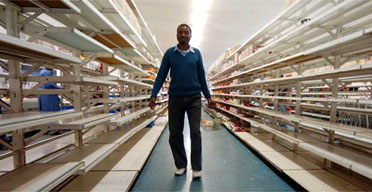Cheap TVs and Cars - A How-To

Photograph: Bishop Asare/EPA
At night, retailers dream about throngs of customers storming the aisles and snapping up the highest-priced items. The customers flood the check-out lanes with their purchases and fist-fulls of cash. It would be better than the day after Thanksgiving. Or, would it?
As with most questions the answer is, "it depends."
Zimbabweans are shopping like there's no tomorrow. With police patrolling the aisles of Harare's electrical shops to enforce massive government-ordered price cuts, the widescreen TVs were the first things to go, for as little as £20. Across the country, shoes, clothes, toiletries and different kinds of food were all swept from the shelves as a nation with the world's fastest shrinking economy gorged itself on one last spending spree.For the monetary-exchange challenged, that's $US 61.10 for a $US 30,550 car. I'll bet the vast majority didn't even have to finance.
Car dealers said officials were trying to force them to sell vehicles at the official exchange rate, effectively meaning that a car costing £15,000 could be had for £30 by changing money on the blackmarket. The owners of several dealerships have been arrested.
President Robert Mugabe's order that all shop prices be cut by at least half, and sometimes several times more, has forced stores to open to hordes of customers waving thick blocks of near worthless money given new value by the price cuts. The police and groups of ruling party supporters could be seen leading the charge for a bargain.
What's the penalty if you don't comply with the government?
The price cuts were ordered by the joint operation command, a committee of army, intelligence and police officers closely tied to the ruling Zanu-PF and chaired by Mr Mugabe.Sounds awfully peaceful to me. So, what is the result of "Operation Reduce Prices"?
The government despatched security personnel and party cadres, including its notorious "green bomber" thugs, to enforce the price cuts, in some cases by beating up shop managers who did not implement them quickly enough.
The impact of the price cuts was felt almost immediately as fuel virtually disappeared from sale after garages were forced to sell petrol for 23p a litre, less than they paid the state-owned supplier.Darn. If only there was some type of science that could predict such an outcome. Oh, wait! Here it is:
The police and army broke the locks on petrol pumps at some garages and tanks ran dry amid panic buying. Now petrol is available only on the blackmarket, at more than seven times the official price and three times what garages had been charging. By Saturday, most minibus taxis had gone from the roads because drivers could not find petrol. Crowds of workers were left on kerbs for hours trying to get to or from their jobs.
The riot police had to be called out to the South African-owned Makro super store in Harare after thousands of people stormed the shop after it was forced to slash prices. The scenes were replicated in stores throughout Harare. The Bata shoe chain's shops were stripped bare in two days by people snapping up pairs for as little as 20p.
Food is still available, although bread, sugar, cornmeal and other staples are hard to find, and meat has all but disappeared because livestock owners say it is now uneconomic to slaughter their animals. Much of the meat that is available is goat slaughtered in backyards and sold in informal markets.
The rest of the food supply - already severely undermined by drought and lack of production on land seized from white farmers - is also under threat after Mr Mugabe threatened to take over manufacturers if they shut down their plants on the grounds that they were uneconomic. "Factories must produce. If they don't, we will take you over ... We will seize the factories," he said.
Economists say the price cuts will only deepen the national crisis, leaving many shops bare because they will not be able to afford to restock while official retail prices remain lower than the cost of buying wholesale or importing. Mr Mugabe has dismissed such warnings as "bookish economics".The sick part of that statement is that he's right. Economists tend to be extremely bookish - if it can't be observed from their desk chair, they aren't interested in it. Until progenitors of the "dismal science" learn to actually use the scientific method "bookish" is the best you can say of them. The Zimbabwe scenario, repeated so many times throughout history, will continue until they do.
However, to do so would require work (something that economists tend to praise, but eschew at all costs). It would require proofs and controlled experiments. It would require hypothesis and testing. It would require publishing results incongruous with personal bias.
Worse, it would require funding. Funding that would have to come from sources open to the possibility of results antithetical to their social agendas.
It's much more fun, I guess, to live in a world where governments promote mass starvation and genocide at the point of a gun.
Labels: economics, economists, inflation, Ron Paul, sound money, Zimbabwe


0 Comments:
Post a Comment
<< Home